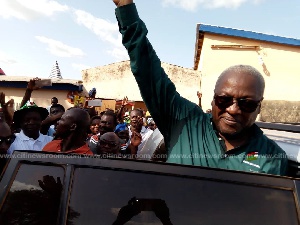 John Dramani Mahama, former President of Ghana
John Dramani Mahama, former President of Ghana
The four years of the Mahama administration brought good economic luck, some prudent policies but also a few instances of self-inflicted pain.
Growth in the Ghanaian economy saw a significant growth during the four years. Growth was supported by strong private consumption in the economy and heavy government spending on capital projects.
The Mahama administration followed prudent fiscal policies for the most part.
Apart from the IMF support to instil discipline into the economy, the administration stayed away from any large handouts to boost the economy when it appeared that growth was faltering.
The period between 2013 and first quarter of 2015 was a challenging year both in terms of the global economic environment and the climatic conditions that impacted our agriculture.
As such, policies by the Ministry of Finance and the Economic Management Team were geared towards adjusting to the prevailing conditions while they ensured the economy remained resilient.
Their policies also strived to ensure the continued building of the productive capacities of the economy. The Finance Ministry and the Economic Management Team implemented prudent policies that ensured that the economy continued to register relatively significant growth during between the second quarter of 2015 and 2016 while inflation was kept in check.
Fiscal policies were geared towards facilitating growth of the private sector. The administration gave financial support to some private companies including Ernest Chemist and Tobinco to expand its operation and increase production
The administration brought back the Ghanaian economy to good health from the brink when it was saddled with high fiscal and current account deficits and high inflation and falling cedi at the time the global economy was fighting lingering slowdown.
Ghana was seen as a bright spot and our growth was projected to remain among the highest in the world before Mahama exited office. The World Bank, the IMF and other financial institutions description of the Ghanaian economy during the time of Mahama as one of the fastest growing economies did not come about by accident.
Ghana attained that level because of the investments the Manama administration made in the oil and gas sectors, education, health, private sector and the level discipline the IMF conditionalities brought instilled in the economy.
The program also reduced the vulnerability of the country's balance of payments in a gradual manner. This allowed the economy to continue on a relatively steady growth path over the whole of 2016.
The administration ensured that the future growth of the economy was protected in spite of election year pressures. Inflation that resulted from both, the depreciation of the cedi against the dollar and low prices of our gold and cocoa on the world market remained stable throughout 2016.
The decision to swap the trainees allowance system with the students loan scheme and to follow the constitutional provision of progressively free secondary education were not just political decisions, they were difficult but prudent economic decisions.
Mr Mahama made one thing clear: that his government wasn't going to compromise its prudent measures with populism to the detriment of the health of the economy.
He was determined to continue to follow sound and prudent economic policies, to ensure that Ghana got a bright future. So of these policies were not popular with the masses especially, the introduction of the loan scheme to replace the allowance system.
He said his government will not take decisions for short-term political point scoring and lived by that principle. When he met students during his 2016 election campaign, he reiterated his position that his government will not shy away from taking those difficult but longer-term healthy economic decisions, if those decisions were in the interest of the country.
His opponents twisted that courageous position for political convenience. He was described by his opponents as an insensitive leader and planted that picture of the former President in the minds of the trainee nurses and teachers.
We must not forget the fact that the first year of the Mahama administration saw the economy deal with the twin shocks of the direct and indirect effects of the supreme court petition on economic activities and government transactions and low prices of our commodities on the international market.
These shocks led to shortage of cash between 2013 and 2014, impacting transactions.
In spite of all the difficulties enumerated the Mahama administration made significant achievements in the economy before exiting office in 2017
- The world bank projected that the economy will grow by 8 percent between 2017 and 2018.
- The perennial power crisis was permanently solved
- The economy of Ghana was rated among the fastest-growing economies in Africa
- The Cedi became relatively stable and was graded the second currency in the subregion
- Ghana was rated the most business-friendly environment in West Africa
- Foreign and local investment increased significantly between 2015 and 2016.
- Ghana's exports grew in the last 12 months of the administration. As the administration entered its final year (election year), the spectre of wide current account deficits, which was not adequately covered by capital flows re-emerged but the President and his team were firm on their on their anti deficits. For the first time in the history of the fourth republic, the election's effect on the general economy was stridently regulated to avoid unnecessary pressure on the economy.
One of the targets of the Mahama administration was that it would help create thousands of jobs through a focus on manufacturing, the YES concept, giving major contracts including road construction, hospital and schools construction etc to private firms and also offer financial support to local manufacturers to expand their operations and production.
The administration introduced certain strategic tax policies including removal of taxes on some items to support the local businesses.
Government introduced these policies to help boost local business operations to enable private businesses employ more Ghanaians.
The ultimate success of market is in providing benefits to the ordinary Ghanaian and our farmers.